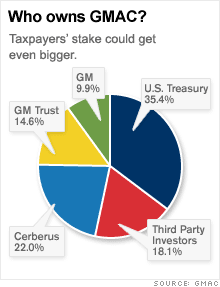New boss named for bailed-out GMAC
The struggling lender brings in former Citigroup exec Michael Carpenter to lead its 'next phase of renewal.'

NEW YORK (Fortune) -- Troubled auto and mortgage lender GMAC shook up its executive suite on Monday, naming former Citigroup executive Michael Carpenter CEO.
Carpenter, 62 years old, replaces Al de Molina, who had led the company since April 2008.
During de Molina's reign, GMAC converted itself into a bank holding company and sold a third of itself to the government in exchange for two multibillion-dollar infusions.
But the company's finances continued to deteriorate, leading to discussions about a third round of aid - and a change at the top that the company said will focus on "accelerating the strategic and operational changes necessary to focus GMAC on its core auto finance and related businesses."
"Mike Carpenter is a world-class CEO, and the board has great confidence that he is the right leader for GMAC at this pivotal moment," GMAC said in a statement. "GMAC will benefit from Mike's broad and deep experience in banking, capital markets, turnarounds and corporate strategy."
GMAC has twice been bailed out by the government in the name of supporting the struggling domestic auto industry. The firm provides financing for General Motors and Chrysler, which were forced into bankruptcy and restructured by the Obama administration. GMAC received $6 billion in December and $7.5 billion in May.
After posting more losses this year, it is now in line for a third round of federal funds.
But GMAC said Monday it has asked Treasury to postpone its decision on further taxpayer funds for the lender until Carpenter and his management team "have assessed the current situation and can advise the board and Treasury regarding the appropriate amount and form of such funding."
As part of this spring's stress tests of the nation's largest banks, the government told GMAC to raise at least $5.6 billion from private investors by Nov. 9. GMAC said last month it was working with regulators to strengthen its finances.
The company's failure to raise funds from private investors points to the problems facing Carpenter as he takes the reins from de Molina, who joined after a stint as the chief financial officer at Bank of America (BAC, Fortune 500).
GMAC lost $5.3 billion in the first nine months of 2009, as demand for cars remains tepid and previous loans continue to go sour.
GMAC is best known for providing financing to car dealers and consumers, but its problems extend well beyond the troubled U.S. auto market. The company's plunge into residential real estate via its Residential Capital home lending unit also has proved costly.
GMAC has been propping up ResCap via capital injections, but the firm said in its quarterly report with the Securities and Exchange Commission this month that there "remains substantial doubt about ResCap's ability to continue as a going concern."
Carpenter has been a member of GMAC's board since May, when the company shook up its governance as the Treasury made its second major investment in the company.
Carpenter was also a board member at CIT (CIT, Fortune 500), the small business lender that recently filed for bankruptcy after failing to secure a second Treasury bailout. He quit that board to take the GMAC chief's job, GMAC said.
Previously he was chairman and CEO of Citigroup (C, Fortune 500) Alternative Investments from 2002 to 2006, and chairman and CEO of Citigroup's Global Corporate & Investment Bank from 1998 to 2002. ![]()
-
 The retail giant tops the Fortune 500 for the second year in a row. Who else made the list? More
The retail giant tops the Fortune 500 for the second year in a row. Who else made the list? More -
 This group of companies is all about social networking to connect with their customers. More
This group of companies is all about social networking to connect with their customers. More -
 The fight over the cholesterol medication is keeping a generic version from hitting the market. More
The fight over the cholesterol medication is keeping a generic version from hitting the market. More -
 Bin Laden may be dead, but the terrorist group he led doesn't need his money. More
Bin Laden may be dead, but the terrorist group he led doesn't need his money. More -
 U.S. real estate might be a mess, but in other parts of the world, home prices are jumping. More
U.S. real estate might be a mess, but in other parts of the world, home prices are jumping. More -
 Libya's output is a fraction of global production, but it's crucial to the nation's economy. More
Libya's output is a fraction of global production, but it's crucial to the nation's economy. More -
 Once rates start to rise, things could get ugly fast for our neighbors to the north. More
Once rates start to rise, things could get ugly fast for our neighbors to the north. More







